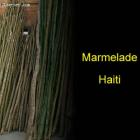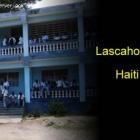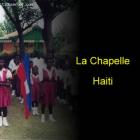ADVERTISEMENT
Dominican Republic - Haiti Observer Blog
Dominican Republic, Haiti Observer Blog. Read the following articles about Dominican Republic
Haiti jumped 15 slots, in 2013 Global Peace Index, leaving Dominican Republic behind
If the outstanding performances of the Haitian soccer team did not impress you about our recent progress, here is another one peace of news that will demonstrate to you or anyone in doubt that Haiti may finally be on the path to success.
The latest Global Peace Index just released showed Haiti's improvement in overall peace is the third best globally beside Chad with the number one position and Georgia, number 2.
The yearly Global Peace Index report had showed an improvement of 15 slots, moving from 107 to 92 in the world.
Interestingly enough, in comparison to our Caribbean neighbors, Haiti has been the country with the greatest improvement in terms of peace over the past year. We are safer than the Dominican Republic and Jamaica, while moving closer and closer to be as safe as Cuba.
Haitian workers repatriated from Central Barahona Sugar Consortium plantations
In a blatant disregard of human rights, several hundred repatriated Haitian seasonal workers were abandoned at the Haitian Customs Office in the Dominican Republic in May. Human rights agency Siské Jano Border Network (SJBN) investigated and discovered not one of the workers employed as sugarcane cutters for Barahona Sugar Mill Consortium (BSMC) possessed a visa, required to work in the Dominican Republic (DR) where BSMC is located.
The Haitian Directorate General of Immigration (DGI) is responsible for issuing visas, but apparently made concessions to BSMC, so BSMC could avoid the cost of providing workers' documentation. And it seems DGI didn't want to absorb the cost either. The Haitian Customs Office could not process the repatriates without a record of their immigration status. But they are also at fault for not alerting the DGM, according to that office.
Global Peace Index, Haiti improved 15, from ranked 107th to 92 out of 162 countries
Since 2008 there has been a gradual fall in the global peace index with peace levels declining by 5%. Though the world as a whole has become less peaceful place to live in, Haiti has shown remarkable improvements in the global peace index. The country managed to jump up 15 slots in the world ranking list and now currently sits at position 92.
It has been found that the global decline in the peace levels is not a result of any external conflicts, i.e. conflict between countries. It is rather caused by internal conflicts. The improvements registered by Haiti are 3 best globally with Chad and Georgia booking 1st and 2nd spots respectively when it comes to overall improvements.
Haiti Accord with Convention on Biological Diversity to Improve and Maintain Natural Resources
The Caribbean contains a high level of biodiversity at risk of further degradation. The Caribbean Biological Corridor (CBC) has been set up to facilitate cooperation between Caribbean countries to engage in biodiversity restoration and sustainability practices used world-wide. The CBC is comprised of three nations. Haiti and the Dominican Republic, sharing the island of Hispaniola, and Cuba, lying to the north, are subject to frequent natural disasters. These events weaken biodiversity infrastructure and scare off organizations that worry increases in expenditures will bankrupt their efforts.
Haiti ranks second in natural-resource differentiation with over 30% flora and 75% vertebrates native and omnipresent on the island. Despite these impressive statistics, its tree-canopy coverage has been severely depleted, with only 1.5% of Haiti's landmass blanketed.
The History of Haitian Migration in the US and elsewhere
History of Haitian migration is pretty old. While millions cross the borders to become permanent residents of other countries, there are millions others who ride the same ferry but only to return after some time. Millions of Haitian people migrate and settle in Bahamas, Montreal in Canada, Cancun and Mexico City in Mexico, Cuba, United States and Dominican Republic. Other countries like French Guiana, French Antilles, France, Senegal, Cote d'Ivoire, Chile, Puerto Rico, Turks and Caicos and Jamaica also have vast numbers of Haitian diaspora.
As of date, it is estimated that around 1.2 million Haitian people live in U.S. with proper documents while there are many others that have entered U.S. borders illegally. Canada is reported to have 200,000 Haitians while Dominican Republic is estimated to have 2 million Haitians. Bahamas accounts for 80,000 Haitians while the reported figure for France is 90,000.
Elie Lescot Ruled by Force and Intimidation
Elie Lescot became Haiti's 31st president in 1941. Born into the mulatto elite class, Lescot began his political career after the death of his wife. He served in the Chamber of Deputies, Parliament's lower house, later becoming a political appointee under presidents Borno and Vincent.
His position as Ambassador to the Dominican Republic (DR) led him to become an ally of DR President Trujillo. Trujillo's political capital helped Lescot win the presidency, despite the Chamber of Deputies opposition of him.
Elie Lescot immediately wielded power by installing himself as Commander of the Military Guard and populating government posts with Caucasian and mulatto elites. Haiti's majority black populace detested him for his prejudice.
Faustin Soulouque, Haiti Monarchy
Faustin-Élie Soulouque was ushered into office as Haiti's 9th President in 1847. He was installed by advocates of the Boyerist movement as a figurehead ruler. But he soon rebelled, staging a coup against his supporters and turning his government into a dictatorship. Faustin ensured his totalitarian rule through devotion of a citizen militia, and finally persuaded Parliament to crown him Emperor of Haiti in 1849.
As emperor Faustin-Élie Soulouque ruled with a centralist government and created a black nobility with dukes, marquis, counts, barons, and nobles of lower rank. He formed military, civil, and religious orders, and created a Royal Academy of Art.
Plan for Reliable, Cost-efficient and Clean Energy to DR and Haiti
Plans for a substantial investment by the International Finance Corporation (IFC), geared towards creating power solutions for Haiti and the Dominican Republic, were recently announced. The World Bank Group member, in tandem with their African, Latin American and Caribbean Fund (IFC ALAC) will help InterEnergy Holdings (IEH), a leading private investor in the propagation of power in Haiti's neighbor country, with interests in the power sector of the region, to create energy that is more efficacious in its productivity while leaving a smaller carbon footprint.
The $100 million endowment is an equity investment towards developing cleaner energy sources within the Caribbean, with plans of expansion into Latin American territories. The Dominican Republic has already made plans to cut down their emissions by 25% in time for 2030, and, already a proponent of the 'clean bill', Haiti's per capita carbon emissions is less than 185 other countries, at less than 0.1%.
Daniel Supplice, New Haiti's ambassador to the Dominican Republic
We received the news that Daniel Supplice, the former Minister of Haitians Living Abroad, was appointed on March 5, 2013 by President Michel Martelly to become the new Haiti's ambassador to the Dominican Republic.
Daniel Supplice is a well known and experienced Haitian Foreign Diplomat. He was Consul General of Haiti in Tokyo, Japan from 1973 to 1974, First Secretary, Embassy of Haiti, in Rome, Italy from 1974 to 1976, First Secretary, Embassy of Haiti in Mexico City from 1976 to 977. He was also Director General of Immigration and Emigration from 1977 to 1979, Director General of Immigration and Emigration in 1979, Under-Secretary of State for the Interior and National Defence from 1979 to 1981.
Stenio Vincent Uneasy Alliance with the Dominican Republic
Stenio Vincent was the 30th President of Haiti, from 1930-1941. Born of mixed-race parentage, he earned his law-school degree by his 18th birthday. He rose to prominence in the leadership role in the Chamber of Deputies before running for the presidency. As part of his political platform, he voiced extreme disapproval of the U.S. occupation of Haiti. Vincent won the National Assembly majority vote and assumed office in October 1930.
By 1934, after U.S. military forces pulled out, Stenio Vincent began oppressing opposition leaders, spying on and incarcerating them. Now a loyal supporter of U.S. democracy, he became signatory on a trade agreement with them. In 1935, he won the popular vote, keeping him in office until 1941.
Our objective is to share with you news and information about Haiti and the people of Haiti. Traditions, habits and the way we were or grew are alive in this site. We highly recommend that you Subscribe to our Newsletter and also share with us some of the things that are memorable and made us unique people.

 Marmelade, Haiti
Marmelade, Haiti  Battle of Vertieres
Battle of Vertieres  Lascahobas, Haiti
Lascahobas, Haiti  La Chapelle, Haiti
La Chapelle, Haiti  Something to think about
Something to think about